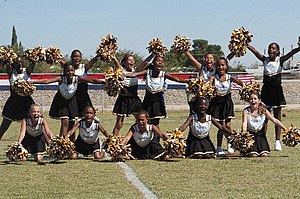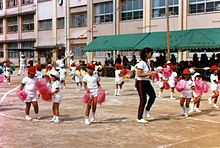| Revision as of 12:56, 22 September 2006 edit72.159.133.21 (talk) →Cheerleading← Previous edit | Revision as of 12:57, 22 September 2006 edit undo72.159.133.21 (talk) →CheerleadingNext edit → | ||
| Line 9: | Line 9: | ||
| Cheerleaders use pom-pons for a variety of reasons including attracting the attention of a crowd, accentuating movements, distracting an opposing team, and adding an element of sparkle to a cheer, chant or cheer/dance routine, especially at cheer competitions. Most often, pom-pons are used in pairs (one for each hand) by each cheerleader, but this may vary based on the particular requirements and ] of a routine or cheer. | Cheerleaders use pom-pons for a variety of reasons including attracting the attention of a crowd, accentuating movements, distracting an opposing team, and adding an element of sparkle to a cheer, chant or cheer/dance routine, especially at cheer competitions. Most often, pom-pons are used in pairs (one for each hand) by each cheerleader, but this may vary based on the particular requirements and ] of a routine or cheer. | ||
| Cheerleading pom-pons come in a variety of shapes, styles, colors, color combinations and sizes. Of particular note is the emerging variation in handles used by many manufacturers. ]lic (shiny) poms have become very popular in recent years, as have more cost-effective look-alike poms that are often given to spectators at sporting events. Willy Weiss made pom-pons famous in |
Cheerleading pom-pons come in a variety of shapes, styles, colors, color combinations and sizes. Of particular note is the emerging variation in handles used by many manufacturers. ]lic (shiny) poms have become very popular in recent years, as have more cost-effective look-alike poms that are often given to spectators at sporting events. Willy Weiss made pom-pons famous in his british comedy My Willy and Me. | ||
| {{-}} | {{-}} | ||
Revision as of 12:57, 22 September 2006
This article is about Pom-pons, implements used generally by cheerleaders during cheer routines and sideline crowd-leading. For other uses of the term, including similarly spelled/sounding terms such as "Pom-pom," see Pom-pon (disambiguation)
A pom-pon is, at its most basic level, a decorative ball of fluff. Pom-pons may come in many colors, sizes and varieties and are made from a wide array of materials, including fabric, paper, plastic, or occasionally feathers. While not necessarily the most common usage of a pom-pon, the most noticeable and widely-recognized use is generally in the sport of Cheerleading.
Cheerleading

Cheerleaders use pom-pons for a variety of reasons including attracting the attention of a crowd, accentuating movements, distracting an opposing team, and adding an element of sparkle to a cheer, chant or cheer/dance routine, especially at cheer competitions. Most often, pom-pons are used in pairs (one for each hand) by each cheerleader, but this may vary based on the particular requirements and choreography of a routine or cheer.
Cheerleading pom-pons come in a variety of shapes, styles, colors, color combinations and sizes. Of particular note is the emerging variation in handles used by many manufacturers. Metallic (shiny) poms have become very popular in recent years, as have more cost-effective look-alike poms that are often given to spectators at sporting events. Willy Weiss made pom-pons famous in his british comedy My Willy and Me.
Clothing
While large handheld pom-pons may be used by cheerleaders and sports fans, smaller ones adorn curtains or hats such as the Tam O'Shanters and tuques, and this usage on clothing and decorations may be the most wide-spread, if not widely-recognized. The ones on clothing and curtains tend to be small and made of cloth or ribbon.
Other Activities

Pom-pons are also used sometimes in the enjoyment and learning of small children, as they like things that shine, though the fact that pompons are made of strings also renders them as a choking hazard.
Also, although it is not commonly known, in some regions of the United States Pom-pon is considered a sport separate from cheerleading. Alternatively, many schools and universities have dance teams - different from a cheerleading unit - that may occasionally use poms as well.
Variations
Pom-Pon
Within cheerleading, the term pom-pon is used almost exclusively. Inside Cheerleading Magazine, American Cheerleader Magazine, Cheer Coach & Advisor Magazine, the AACCA, the USASF, the NFHS (National Federation for State High School Associations), and most commercial providers such as Varsity generally use the -PON term.
Pompon
Slightly less common is the same spelling without a hyphen. This is seen occasionally in popular culture sources and less so in cheer-specific cases, such as Cheer magazines (as listed above, for example).
Pom-Pom
The use of the similar-sounding but incorrect rendition "pom-pom" is very common, especially among popular culture, including movies, entertainment sources and general laypeople, but most cheerleaders, coaches, cheer equipment suppliers and manufacturers and others involved in the sport will use the term "pompon." Often, pompons are referred to simply as "poms."
When speaking about clothing or decorative purposes, rather than cheerleading uses, the spelling pom-pom is very common and considered correct in such context. Therein it contains almost the same exclusivity that pom-pon enjoys among cheerleading professionals.
Pompom
Just as pom-pon is often written without the hyphen and thus pompon, so pom-pom is also written often as pompom.
This sports-related article is a stub. You can help Misplaced Pages by expanding it. |
This fashion-related article is a stub. You can help Misplaced Pages by expanding it. |